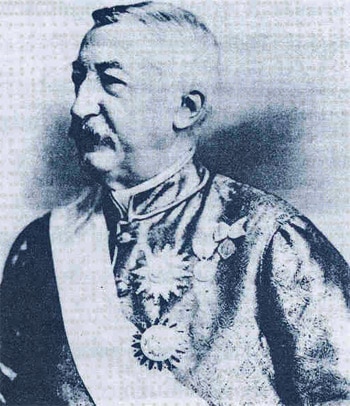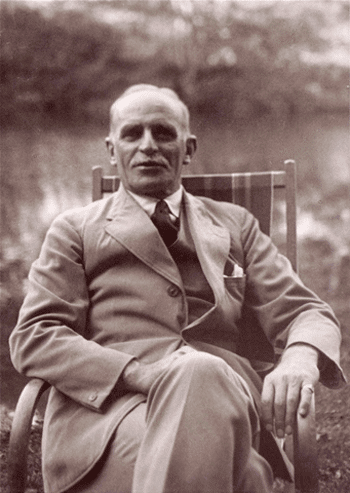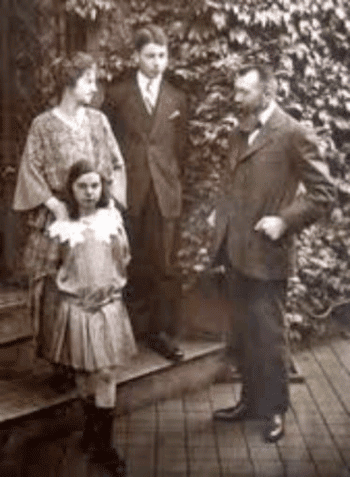The Rolin-Jaequemyns Mission Legal Advisers

Rolin-Jaequemyns (Source: Wikimedia)
In order to fully form part of the European-dominated world order of the late nineteenth century, a number of non-Western states were diplomatically put under 'gentle pressure' by the great powers at the end of the nineteenth century to comply with a number of conditions. For example, Siam – present-day Thailand – had to adopt a modern legal system, comply with international legal rules, set up a diplomatic corps and have properly functioning government bodies. To steer this modernization of the Siamese state in the right direction, the Siamese government appealed to the Belgian lawyer and former politician Gustave Rolin-Jaequemyns (1835-1902).
Gustave Rolin-Jaequemyns was 57 years old and had already had an impressive career when he arrived in Siam in 1892. This politician with a distinctly liberal profile was a former Belgian minister of the interior and, as an internationally renowned lawyer, had a big say in the establishment of the Nobel Peace Prize in 1904. Institut de Droit International. Incidentally, since 1874 he led a committee within this institution that dealt with issues of extraterritoriality in Asian countries.
Contrary to what is assumed, the first contacts of Gustave Rolin-Jaequemyns with representatives of the Siamese government must have taken place as early as 1891 during the European mission of Prince Damrong, who was looking for support and allies at that time. After all, Rolin-Jaequemyns had sent a CV to Frederick W. Verne, the secretary of the Siamese Legation in Bombay, before the end of that year. In any case, it seems that the British had a strong say in this appointment and that in itself is not surprising because Rolin - Jaequemyns was not exactly known as a friend of France and could therefore be useful to the British in limiting French colonial aspirations in the Far East.
Although Rolin-Jaequemyns became chief adviser on both foreign and domestic policy to the Siamese government between 1892 and 1901, he was mainly concerned with introducing much-needed legal reforms. This was largely facilitated by the Ministry of Justice established in Bangkok in 1892 and the Legislative Council established in January 1895 at his direction. In the following years, the latter institution would be intensively involved in the codification and reform of Siamese legislation. The intention was not to blindly copy foreign examples, but to create completely new basic legislation with respect for the old laws and regulations. For the reform of the courts, however, Rolin-Jaequemyns did get the mustard abroad, namely Great Britain.
Shortly after Rolin – Jaequemyns arrived in Bangkok, he not only had his wife Emilie and daughter Henriette come over, but also a number of lawyers – most of them from liberal-oriented families from Brussels and Ghent – who had to assist him in his task. The first and most important of this so-called Mission Rolmin-Jaequemyns was undoubtedly Robert John Kirkpatrick de Closeburn, a lawyer of Scottish origin born in Brussels on 8 May 1865. Kirkpatrick, cum laude cum laude doctor of juris was promoted to the Free University of Brussels was a promising lawyer who, after arriving in Bangkok in February 1894, quickly emerged as the right-hand man of Gustave Rolin – Jaequemyns. And it didn't stop there because on May 5, 1896 he married Henriette Rolin in the Protestant church in Bangkok. The fact that the Siamese princes and ministerial excellencies Damrong, Devawongse and Bhanurangsi were among the witnesses to this wedding was a sign of the prestige that Kirkpatrick enjoyed. Their children, born in Bangkok, would also spend most of their lives in the legal sphere. Daughter Nell (°1898) married the well-known legal historian Frans Ganshof. Son Robert jr. (°1899) became professor of British law at the Free University of Brussels. He died on April 4, 1991 in Brussels. His son Jean Robert (1934-2015) was a lawyer at the Court of Cassation and former President of the Bar.
Kirkpatrick, who apparently kept a high pace of work, would, in addition to his legislative work, also almost single-handedly be responsible for clearing the enormous amount of backlogs of lawsuits in the provinces. He could count on the active support of Prince Rajburi, who in 1891 attended the prestigious Christchurch College graduated from Oxford as a lawyer, the third Siamese ever to have completed a foreign law degree. In March 1896, this son of King Chulalongkorn was appointed Minister of Justice. Kirkpatrick not only had a big say in restructuring the Siamese legal institutions, but, like his father-in-law, also became actively involved in shaping Siamese foreign policy. For example, he successfully conducted the negotiations that led to the Siam-Japan pact of 1898. A year later, Robert Kirkpatrick, very weakened by malaria, returned to Belgium with his family, where he succumbed shortly after his arrival…
In the year 1900, when the mandate of the Rolin-Jaequemyns mission was coming to an end, 9 of the 11 legal advisers of the Siamese government were Belgians. The other two were the Dutchman Patijn and the Japanese Masao. In total, 14 Belgian lawyers are said to have been active in Siam for a shorter or longer term in the context of the Mission Rolin – Jaequemyns.
One of the other key figures was Corneille Schlesser (1866-1952). Born in Ell, Luxembourg, this doctor of law was registered as a lawyer at the Brussels bar. He was married to Marie Geoffroy and arrived in Siam in 1895 at the request of Gustave Rolin. Initially he was mainly concerned with reforming the judicial authorities, but in 1900 he succeeded Kirkpatrick, who had returned to Belgium, as chief legal adviser to the Siamese government. He was also part of the committee that, between 1905 and 1908, under the leadership of the French jurist Georges Padoux, compiled the Siamese Penal Code.

Pierre Orts in 1934
Pierre Orts (1872-1956) was, so to speak, cut out for a legal career. He belonged to the sixth generation in an unbroken line of prominent legal experts. His grandfather was the former liberal minister of state Auguste Orts, lawyer, professor and historian. Pierre Orts' father was a counselor at the Court of Cassation in Brussels. As a new doctor of law, he was chief of staff of the Rolin – Jaequemyns mission in Bangkok between 1896 and 1898, where he was mainly concerned with the legal implementation of Siamese foreign relations. In the autumn of 1897, for example, he visited the Laotian and Northern Siamese vassal states as plenipotentiary commissioner of King Chulalongkorn. In March 1898 he returned to Belgenland to recover from malaria. Pressured by his family, he did not return to Southeast Asia, where he had been offered a new job as a legal adviser in Luang Prabang. He entered the Belgian diplomatic service and was mainly concerned with colonial policy in Congo. He ended his career as Secretary General of the Ministry of Foreign Affairs. He was the father-in-law of the equally influential lawyer Walter Ganshof van der Meersch.

Family Jottrand
Auguste Dauge (1865-1947) from Ghent also came from a family of renowned lawyers and academics. This lawyer, who - which was a nice bonus - also had a degree in commercial and consular sciences, had just turned 32 years old when he arrived in Bangkok. Less than three years later, he left Mission Rolin – Jaequemyns, but he used his experience and network to be appointed to various diplomatic posts in Asia. For example, he was Belgian vice-consul in Beijing.
The 28-year-old Emile Jottrand (1870-1966) became a member of the International Court of Justice in Korat and was part of the Borisapha and the Court of Appeal in Bangkok He was married to Denise Weiler who had followed her husband to Bangkok. After their return to Belgium in 1905, the couple published the still readable Au Siam – Journal de voyage de M. et Mme. Jottrand. Emile Jottrand would later regularly publish articles about Siam in the national press. Unlike most of the other members of the Rolin-Jaequemyns Mission, he did not go into diplomatic service or remain a lawyer, but became the director of the Institute Superior de Commerce in Mons.
Félicien Cattier (1869-1946) was 27 when he started working in Bangkok for one year in the Belgian legal mission. Rolin – Jaequemyns called him one of the most promising talents at the Brussels bar. However, he was not only a lawyer, but also a doctor of political and administrative sciences. After his 'service time' in Siam, he was one of the founders of the 'takeover' of Leopold II's Congo Free State by Belgium. This professor at the ULB became governor of the Société Générale and chairman of the Union miniere du Haut-Katanga one of the most important Belgian financiers and bankers in the first half of the twentieth century. It earned him a baron's title. René Sheridan, who had worked with Cattier for a while, would stay in Siam the longest of all Belgian advisers. He served the Siamese government for over a quarter of a century and was given the honorable title of Phyay Vides Dharmamontri by King Vajiravudh. He died in Bangkok in 1927. Like Kirkpatrick and Schlesser, René Sheridan sat in a consultative capacity on the Supreme Court, the San Dicka.

Félicien Cattier (right in the photo) in 1924
We only know of Charles Symon and R. Timont that they worked as assistant legal advisers in Bangkok, Phuket and Phitsanulok. They also went into diplomatic service afterwards. Charles Robyns, on the other hand, was actively involved in the legal delineation of the Siamese territorial boundaries and published on this The 1905 Siam boundary delimitation Album. Unfortunately, I have not been able to find details regarding the careers of the other advisers, in particular A. Henvaux, L. De Busscher and A. Baudour. Unfortunately, inquiries in the archives of Foreign Affairs in Brussels also yielded nothing…


A nice overview of how the ties in the personal and personal sphere have promoted the harmonization of Siamese and Western legislation.
Perhaps an overview of the content of this harmonization will follow from this?
One of the more thorny issues in this meeting of Western and Siamese law was the problem of polygamy, polygyny to be more precise. King Vajirawuth, Rama VI, defended polygamy as a Thai tradition, although he felt that all those women deserved better legal protection. There was a budding feminist movement in the early 20th century that advocated monogamy, mainly because polygamy usually led to injustice, and furthermore because it was the only civilized form of marriage in Western eyes.
Tempers ran high, there were fierce discussions. I believe that not long after 1932 a law was passed legalizing monogamy as the sole form of marriage.
I'm writing a piece about Thailand's encounter with the West, but I'm not getting anywhere.
What a valuable contribution from Lung Jan in various areas.
At the end of the 19th century, Belgium was known as a progressive, tolerant, free-thinking country, which also offered a home to many dissidents from other countries.
(There are many acquaintances among the asylum seekers, a few: Karl Marx, Baudelaire, and Eduard Douwes Dekker in disagreement with the Dutch government regarding the serious discrimination against the inhabitants of the Dutch East Indies… But the list is longer.)
This liberal world of thought is also reflected in the laws and jurisprudence. And in the magistracy and top legal profession. It was not for nothing that Belgium had already adopted a very progressive constitution in 1830, when it separated from the Netherlands.
It is important that Lung Jan highlights an episode that provides proof of the above.
Another aspect that draws Lung Jan is the importance of international diplomacy. Reporting often simplifies tensions and conflicts between countries to black and white. See, for example, Erdogan's agitation against Macron at the moment. In the end, it will be diplomats who will have to clean up the mess.